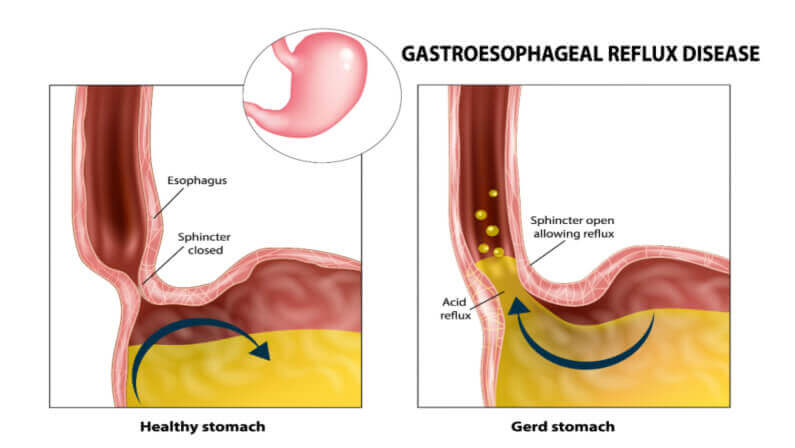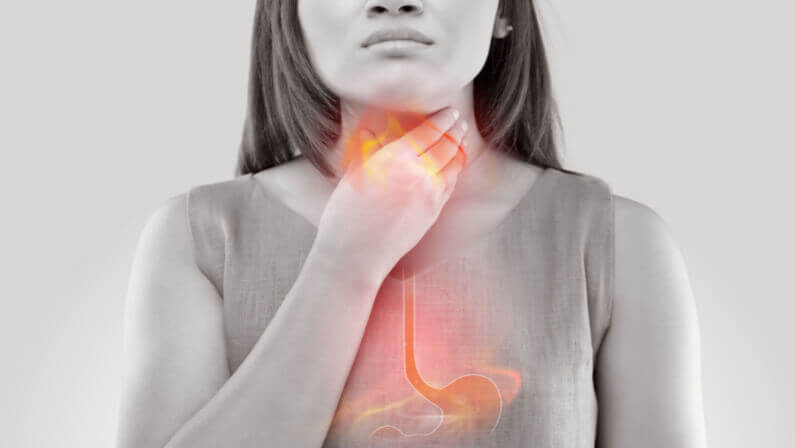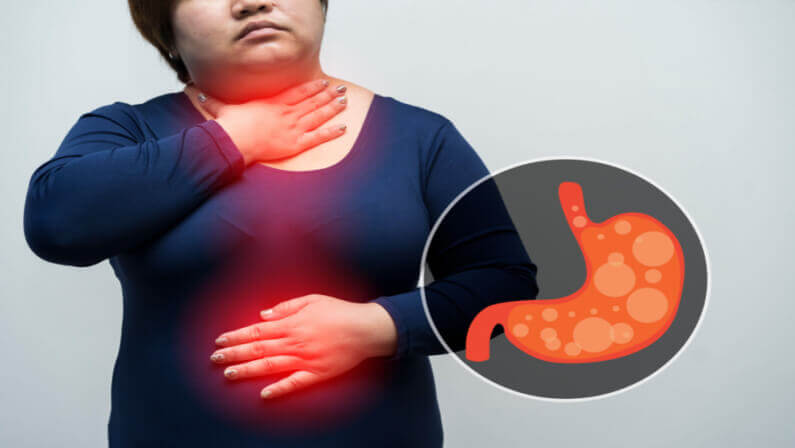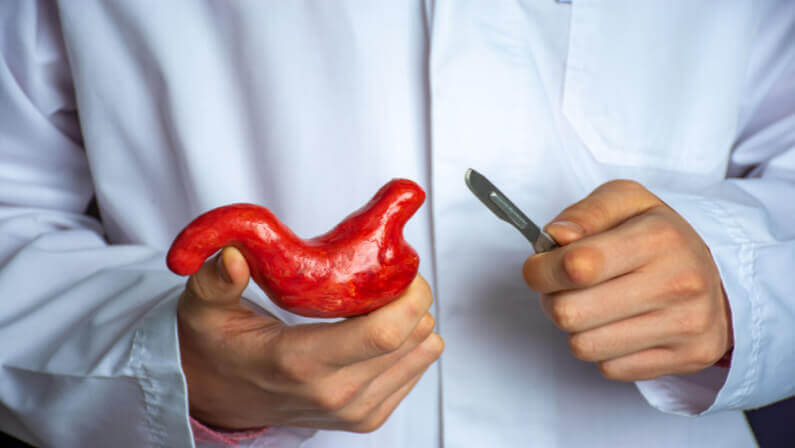Gastro-oesophageal reflux disease (GERD) is a common digestive disorder that affects millions of people worldwide.
It is characterized by the backward flow of stomach acid into the esophagus, causing heartburn and other uncomfortable symptoms. Many people with GERD wonder how long they will have to live with these symptoms, but the answer is not always clear.
In this article, we’ll take a closer look at GERD, what causes it, and what you can do to manage it. We’ll look at the factors that influence the duration of GERD and give you the information you need to make the right decisions for your health.
The Stages of GERD
GERD can be divided into several stages based on the frequency and severity of symptoms.
These stages are:
- Mild GERD: This stage is characterized by occasional heartburn after eating or lying down. Symptoms are usually mild and do not interfere with daily activities.
- Moderate GERD: In this stage, symptoms are more frequent and intense. Heartburn may last for several hours and may disrupt sleep.
- Severe GERD: This stage is characterized by frequent, severe symptoms that affect daily life. Heartburn may occur several times a day and may be accompanied by other symptoms such as chest pain, difficulty swallowing, and a persistent sore throat.
- Complicated GERD: This stage is characterized by the development of complications such as Barrett’s esophagus, a condition where the lining of the esophagus changes due to exposure to stomach acid. This can increase the risk of oesophageal cancer.
It’s significant to consider that not everyone with Gastro-oesophageal reflux disease will experience all of these stages, and the progression of GERD can vary from person to person.
However, if you are experiencing frequent, intense symptoms or have developed complications, it’s essential to seek medical attention to prevent further damage to your esophagus.
What Causes Acid Reflux?

Acid reflux is caused by the backflow of stomach acid into the esophagus, which can occur due to a weak lower esophageal sphincter (LES).
This can be caused by numerous factors such as:
- eating a large meal
- lying down after eating
- Obesity
- Pregnancy
- alcohol consumption
- smoking
- and certain medications
Certain foods and drinks such as chocolate, caffeine, spicy or fatty foods, and citrus fruits can also trigger acid reflux.
What are the Symptoms of GERD?
The most common symptoms of GERD are:
Heartburn
This is a burning sensation in the chest that often occurs after eating. The pain can radiate to the neck, throat, or jaw. Heartburn is a result of stomach acid flowing back into the esophagus.
Regurgitation
This symptom is the feeling of food or liquid entering the mouth or throat. It may also taste sour or bitter. Regurgitation occurs when the contents of the stomach back up into the esophagus.
Chest pain
Chest pain associated with GERD can be sharp or burning and can be mistaken for a heart attack. It occurs when stomach acid irritates the esophagus.
Difficulty swallowing (dysphagia)

GERD can cause the muscles in the esophagus to tighten, making it difficult to swallow food and liquids. This can be dangerous if not treated, leading to choking.
Chronic coughing or wheezing
The backflow of stomach acid can irritate the throat and lead to coughing or wheezing. acid reflux is often associated with laryngopharyngeal reflux (LPR), which can cause voice box and throat inflammation.
Hoarseness or sore throat
GERD can cause inflammation in the throat and voice box, leading to hoarseness or a sore throat. The backflow of stomach acid irritating the throat and vocal cords can also cause it.
Bitter taste in the mouth
A bitter or sour taste commonly occurs when stomach acid backs up into the mouth. Sometimes, it can have a salty taste. This is because the acid has damaged the small mucous glands in the back of your throat.
Bad breath
GERD can cause a sour or bitter taste in the mouth, leading to bad breath. Since acid reflux can also cause inflammation in the throat, it can lead to a buildup of mucus, which can mask the smell of food particles on your breath.
It’s important to note that not all individuals with GERD will experience these symptoms, and some may experience different symptoms at different times.
What are the Risk Factors of GERD?

There are many factors that can increase a person’s risk of developing GERD (Gastroesophageal Reflux Disease), including:
- Age: People over 50 are more likely to develop GERD.
- Obesity: Being overweight or obese can pressure the stomach and increase the risk of GERD.
- Pregnancy: Hormonal changes and added pressure on the abdomen during pregnancy can cause GERD.
- Smoking: Smoking can weaken the lower esophageal sphincter and increase the risk of GERD.
- Hiatal hernia: This is a condition in which part of the stomach bulges through an opening in the diaphragm and into the chest, which can weaken the lower esophageal sphincter and increase the risk of acid reflux.
- Certain foods and drinks: Certain foods and drinks, such as chocolate, caffeine, alcohol, acidic fruits, and spicy or fatty foods, can trigger GERD symptoms.
- Certain medications: Some medications, such as aspirin, ibuprofen, muscle relaxers, and blood pressure, can relax your lower esophageal sphincter and add to the risk of acid reflux.
- Genetics: GERD can run in families, suggesting a genetic component.
It’s important to note that having one or more of these risk factors does not guarantee that a person will develop GERD, but it can increase their likelihood.
How Long Do GERD Symptoms Last?
The duration of GERD symptoms can vary from person to person. In some cases, symptoms may occasionally last a few hours. In other cases, symptoms may be more frequent and persist for several days or weeks.
For many people, GERD is a chronic condition, meaning that symptoms come and go over time and may persist for long periods.
If left untreated, it can lead to severe complications, such as esophageal stricture or Barrett’s esophagus, so it’s essential to consult a doctor if you’re experiencing symptoms regularly.
Several factors, including diet, lifestyle, and underlying medical conditions, can influence the duration of GERD symptoms.
Many people can reduce the frequency and duration of their GERD symptoms by making lifestyle changes, such as avoiding trigger foods and drinks, maintaining a healthy weight, and avoiding lying down after eating.
Additionally, medication and other treatments can also be effective in managing GERD symptoms.
How is GERD Diagnosed?
Diagnosis of GERD typically involves a combination of medical history, physical examination, and diagnostic tests.
The following examinations and procedures may be used to diagnose GERD:
- Medical history: The doctor will ask about your symptoms and any risk factors for GERD, such as age, diet, lifestyle, and family history.
- Physical examination: The healthcare professional will conduct an examination to check for signs of GERD, such as redness or swelling in the throat or esophagus.
- pH monitoring: This test measures the amount of acid in the esophagus over 24 hours. A small sensor is placed in the esophagus to measure acid levels.
- Endoscopy: This test involves inserting a flexible tube with a light and camera on the end that is inserted into the mouth and goes through the esophagus to inspect the esophagus and stomach for signs of damage or complications from GERD.
- Barium swallow: This test involves swallowing contrast material while X-rays are taken to help visualize the esophagus and stomach and look for abnormalities.
- Esophageal manometry: This test measures the pressure and muscle contractions in the esophagus to help diagnose issues with the lower esophageal sphincter.
The exact tests used to diagnose GERD will depend on the individual case, and the doctor may use one or several tests to arrive at a diagnosis.
How Do You Treat GERD?
Treatment for GERD depends on the severity and frequency of symptoms but may include a combination of lifestyle changes and medications.
The following are some common treatments for GERD:
Lifestyle changes

Changes to diet and lifestyle can often help manage GERD symptoms. This may include avoiding trigger foods and drinks, such as coffee, tea, alcohol, and spicy or fatty foods. You can also avoid habits such as eating smaller, more frequent meals and avoiding lying down after eating.
Medications
Over-the-counter antacids, such as calcium carbonate (Tums) and magnesium hydroxide (Milk of Magnesia), can neutralize stomach acid and provide fast relief.
Proton pump inhibitors (PPIs), such as omeprazole (Prilosec) and lansoprazole (Prevacid), can reduce the amount of acid produced by the stomach and provide longer-term relief.
H2 blockers
These medications, such as cimetidine (Tagamet) and ranitidine (Zantac), reduce the amount of acid produced by the stomach.
Prokinetics
These medications, such as metoclopramide (Reglan), help strengthen the lower esophageal sphincter and improve acid clearance from the esophagus.
Surgery

In severe cases of GERD that do not respond to other treatments, surgery may be recommended to repair the lower esophageal sphincter or remove the damaged portion of the esophagus.
Working with a doctor to determine the best treatment plan for your case is essential.
Lifestyle changes and medications may help manage symptoms, but monitoring your condition and making any necessary adjustments to your treatment plan over time is essential.
What Complications can GERD Cause?
If left untreated, GERD can lead to several complications, including:
- Esophagitis: Inflammation of the esophagus caused by repeated exposure to stomach acid.
- Barrett’s esophagus: A condition in which the cells in the lining of the esophagus change and become abnormal, which increases the risk of esophageal cancer.
- Strictures: Narrowing of the esophagus caused by repeated exposure to stomach acid, which can make swallowing difficult.
- Bronchitis: Inflammation of the bronchial tubes can lead to coughing and wheezing.
- Pulmonary fibrosis: Scarring of the lungs can lead to shortness of breath and difficulty breathing.
- Tooth erosion: Repeated exposure to stomach acid can damage teeth and cause tooth decay.
It’s essential to seek prompt medical treatment for GERD to reduce the risk of complications. Treatment may involve lifestyle changes, medications, and other therapies and can help manage symptoms and prevent serious complications.
Have Yourself Checked for GERD
To conclude, anyone suffering from symptoms of GERD should be checked and treated as soon as possible.
GERD can be life-threatening if left untreated, so it’s important to seek medical help if you suspect you have GERD.
Treatment may involve lifestyle changes, medications, or surgery and can help manage symptoms and prevent serious complications.
Remember that everyone is unique, so work with your doctor to determine the best treatment plan and medication for your situation.
At Aether Health – Kingwood ER, we provide comprehensive care for a variety of medical conditions, including GERD.
Our experienced team of specialists is here to help you find relief from your symptoms and manage your condition so you can get back to feeling normal. Contact us today to find out how our services can help.
References:
- The Stages of Gerd. Cooper Health Org. https://www.cooperhealth.org/services/gastroesophageal-reflux-disease-gerd/stages-of-gerd#:~:text=The%20states%20of%20GOD-,the%20stages%20of%20gerd,-The%20Stages%20of%20GERD
- Lower Esophageal Sphincter. My Health https://myhealth.alberta.ca/Health/Pages/conditions.aspx?hwid=stl158005&#:~:text=The%20lower%20esophageal%20sphincter%20 Alberta,CA.(LES,the%20esophagus%20into%20the%20stomach.
- How do you treat GERD? Medicine Net. https://www.medicinenet.com/how_long_does_gerd_take_to_heal/article.htm




